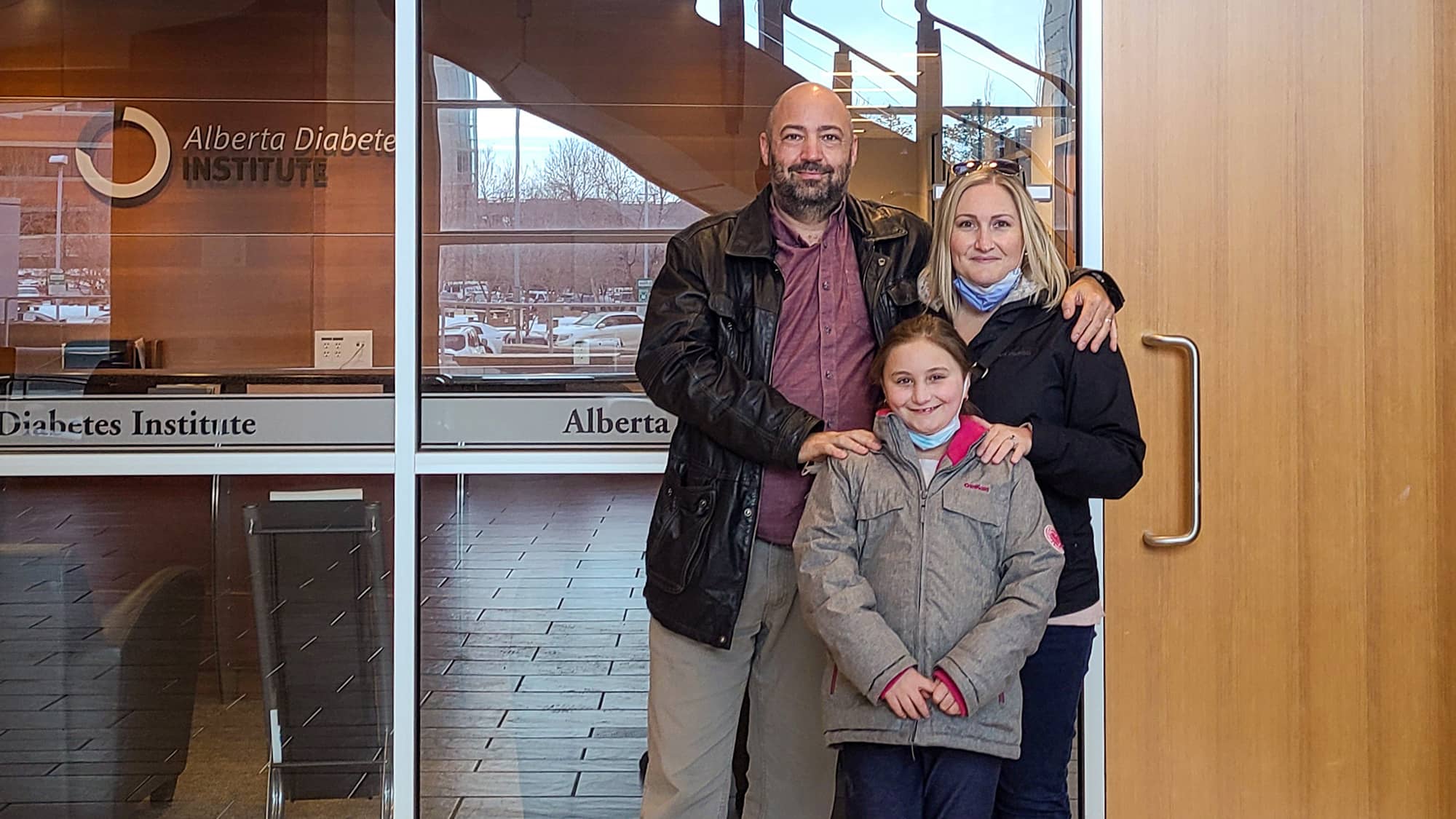Devoted Parents in Search of a Cure
9 May 2023

Donors Colin and Jennifer Quinlan with their daughter Ella.
Ella Quinlan was just seven years old when she was diagnosed with Type 1 diabetes in 2020. That was the beginning of Colin and Jennifer Quinlan’s search for a cure for their daughter.
“Every day that a seven-year old has diabetes is one day too long,” says Colin.
He and Jennifer immediately began looking for the world’s leading diabetes research centres, searching for the best place to provide their financial support.
That’s when they discovered the ground-breaking diabetes research happening at the University of Alberta, home to the Alberta Diabetes Institute (ADI), Canada’s largest stand-alone diabetes research facility. The Quinlans and Ella’s pediatrician toured the ADI and met the institute’s director Peter Senior and leading researchers including James Shapiro and his team. Colin and his family were astonished at how close James and his team are to taking the next step to clinical trials for stem-cell based treatments for type 1 diabetes.
The Quinlans decided the U of A was the right place to commit their gift of $1.25 million in support of diabetes research. Colin and Jennifer are just two of many donors whose collective generosity is bringing the U of A one step closer to finding a cure.
The U of A has a long history of bringing researchers together to develop solutions for diabetes which have then been adopted in clinics around the world. ADI researchers successfully transplanted insulin producing cells from organ donors — a treatment known as the Edmonton Protocol — transforming the lives of people with Type 1 diabetes by eliminating the need for daily insulin injections.
“The work of the ADI is made possible by the contributions of many partners: funders, donors and sponsors enabling researchers to pursue answers to difficult questions and to help develop and train the next generation of diabetes researchers.” — Peter Senior, director of the Alberta Diabetes Institute
In partnership with Alberta Health Services, U of A researchers from the ADI continue to lead the largest clinical islet transplant program in the world, the procedure which helps patients with Type 1 diabetes gain freedom from insulin injections. It continues as a centre of excellence and the gold standard for routine clinical islet transplantation programs.
As a global leader in diabetes research, the U of A has established a unique combination of multidisciplinary expertise across its faculties and institutions.
“The Alberta Diabetes Institute is a central part of a unique ecosystem that allows researchers, clinicians and students to thrive and make game-changing discoveries and translate them to the clinic,” says Senior. “From state-of-the-art core facilities to an on-site clinical research unit facilitating clinical trials, we have the right people and talents to make an impact for patients like Ella.”
It’s this concentration of world-class research, facilities and talent that inspires donors like the Quinlans to lend their support. When asked about his hopes for his daughter, Quinlan says, “I want Ella to not be insulin-dependent. It’s an aggressive goal, but the U of A has the right team to do it.”
But for the Quinlans, philanthropy won’t just end there. Their goal is to continue to fund research in many different pediatric treatments including childhood cancer and mental health.
“Right now, diabetes is the focus,” says Colin. “But that’s not the end. That’s just the beginning.”
Did you know?
The U of A has a long history of diabetes research. This includes the work of biochemist and U of A alumnus James Collip, ’24 PhD, ’26 MD, who helped discover insulin in 1922.
Donor Impact
1,117
research projects advanced by donors
$2M+
annual philanthropic contributions in support of diabetes research
300+
patients treated with nearly 1000 infusions
25%
of global islet infusions conducted at the Alberta Diabetes Institute, the largest islet transplant program in the world